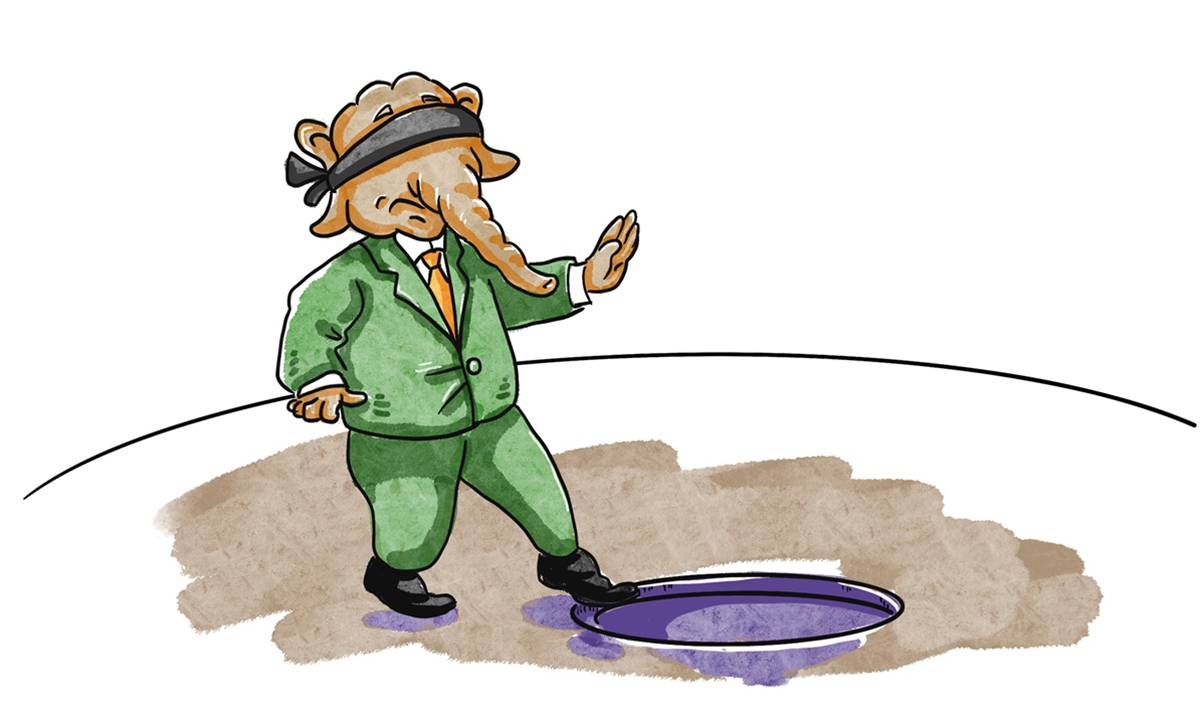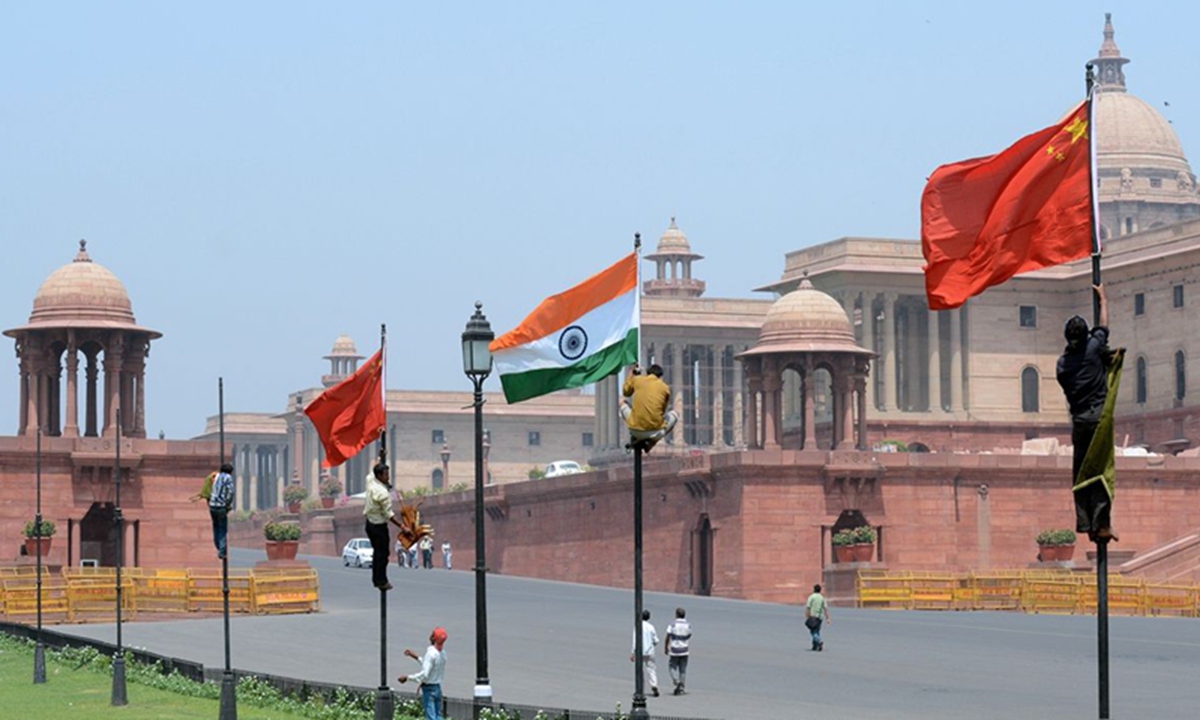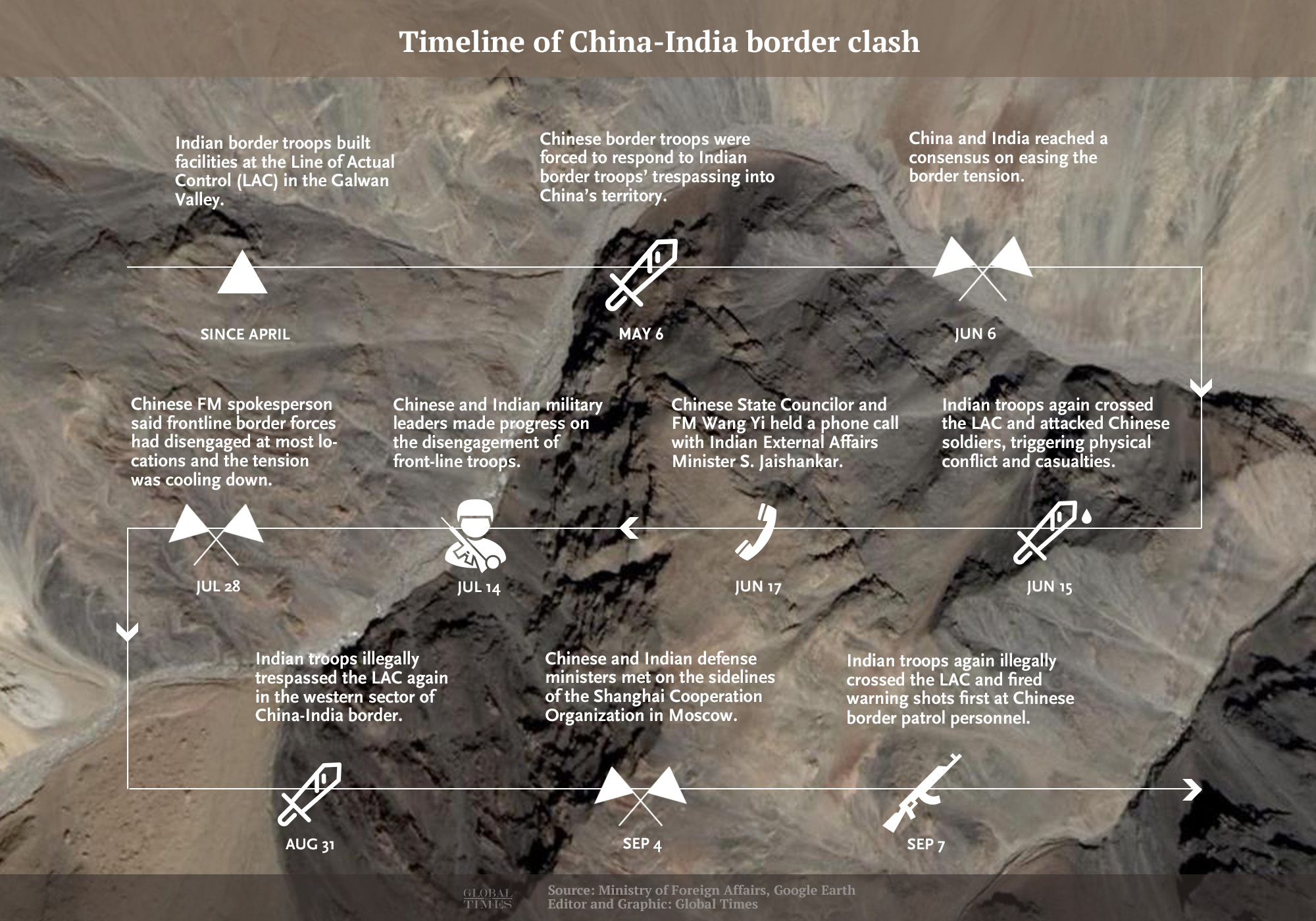India 'fired first' in fresh border clash with China, overrates own strength by pushing for talks with force

China India Photo: GT
China on Tuesday slammed Indian troops for firing first in the Monday border clash and illegally crossing the Line of Actual Control (LAC) again, which it said had destroyed tranquility on the China-India border since 1975, demanding India punish personnel who fired the provocative shot and avoid similar incidents happening again.
The Indian army's firing of shots, the first time it has happened in more than four decades in a border region between China and India, is an extremely dangerous act and set a vile precedent that broke the traditional tacit understanding reached by both sides of not using firearms, Chinese observers said, noting that the risk of accidentally sparking another conflict is getting higher.
As the standoff enters its fourth month, already much longer than the 73-day Doklam standoff in 2017, the latest Indian provocation also showed the country's desperation, as it is hoping to gain more bargaining chips at the negotiation table and end the months-long standoff in its favor as soon as possible, as winter is approaching and the South Asian country is struggling to provide sufficient logistical support to frontline troops for winter, while also facing increasing pressure from its domestic COVID-19 epidemic and border issues with Pakistan, observers said.

China-India
In a rare early morning statement, a spokesperson of the Chinese People's Liberation Army (PLA) Western Theater Command said the Indian troops crossed the LAC at the western section of the China-India border into the Shenpao mountain region near the southern bank of Pangong Tso Lake.
During its operation, the Indian army outrageously fired warning shots at Chinese border defense patrol personnel who were attempting to negotiate, which is a serious military provocation and very vile in nature, and the Chinese border defense troops were forced to take countermeasures to stabilize the situation, Zhang Shuili, the spokesperson said on Tuesday.
Citing a source in the Indian government, India Today confirmed the situation and claimed that the Chinese soldiers fired at Indian positions first.
This is the first recorded instance of gunshots on the India-China border since 1975, India Today said, adding that there was also a brief exchange of "warning shots" during the event on August 31.
India broke the tacit understanding of not using firearms over the past four decades, and set a vile precedent that will leave great danger for the situation to develop, Qian Feng, director of the research department at the National Strategy Institute of Tsinghua University in Beijing, told the Global Times on Tuesday.
Both sides had exercised great restraint in using firearms, and China upholds the principle of not firing the first shot, Qian said.
"India maybe only fired warning shots into the sky this time, but now you cannot rule out the possibility of its troops shooting at people next time," Qian said, noting that China is sure to take countermeasures in an orderly way, albeit the event is very worrying.
Shifting the blame
"It was the Indian side that fired first, and it marked the first time that the tranquility on the China-India border has been broken by gunfire since 1975," said Chinese Foreign Ministry spokesperson Zhao Lijian at a regular press conference on Tuesday.
India claimed that China fired first, which is immoral and degrading, and could be a move to irresponsibly shift the blame onto China, analysts said.
Qian said that China gained the upper hand by announcing the incident first, and India is now attempting to blame China while it can only blame itself.
It is India who has violated agreements and promises that were previously reached by the two sides, and it is trying to build its image as a victim, Qian said. "It is attempting to cover its guilty conscience," he said.
Bargaining chips?
The latest Indian provocation came only days after the defense ministers of China and India met on the sidelines of the Shanghai Cooperation Organization (SCO) meeting in Moscow, Russia on Friday, with Chinese State Councilor and Minister of National Defense Wei Fenghe expressing China's firm determination to defend its sovereignty and territorial integrity.
Indian Defense Minister Rajnath Singh said at the time that India hopes the two sides will adopt a responsible attitude, fully disengage frontline forces as soon as possible, avoid taking measures that may escalate or complicate the situation, and avoid turning divergence into confrontations so as to bring bilateral military relations back on to the right track as soon as possible.
The Indian side's move seriously violated the agreements reached by both sides, stirred up tensions in the region, and could easily cause misunderstandings and misjudgments, said Zhang.
Qian said that Monday's incident exposed India's sense of urgency in the negotiations. India is suffering from a rampaging COVID-19 epidemic at home and more engagements with Pakistan on their border. As it increases troop deployments to Ladakh, it is facing enormous pressure in logistical support and resource allocation as winter approaches.
Compared to the border standoff with China, India's border standoff with Pakistan is more serious and could cause more chain reactions, and India does not possess the military strength to confront both China and Pakistan with high intensity in multiple sectors at the same time, analysts said.
India fears that if the standoff continues, it will not be able to handle the huge pressure, so it desperately wants to disengage as soon as possible, Qian said, noting that despite this, India still wants to boost its interests through negotiations.
On August 31, Indian troops illegally crossed the LAC at the southern bank of Pangong Tso Lake and near Reqin Mountain pass. This latest event makes the southern bank of the lake the latest flashpoint, analysts said.
Qian said that this region was not previously a focus of the border issue, but India now clearly wants to expand the disputed areas to win more bargaining chips in negotiating with China, in the hope that China will meet India's demands in locations like the northern bank of the Pangong Tso, where China holds the advantage.
Indian External Affairs Minister Subrahmanyam Jaishankar said he might meet Chinese State Counselor and Foreign Minister Wang Yi in Moscow during a meeting of the SCO member states' foreign ministers in Moscow on September 10, Indian media outlet the Hindustan Times reported.
Chinese experts said that India's mentality of promoting talks with pressure has not changed, and the latest event showed the trend of pushing for talks with force. Some people in India wishfully think the situation is under control, but in the end, they could be lifting rocks but only dropping them on their own feet.

Infographic:GT
Ready to defend
Zhang said that China demands the Indian side immediately stop its dangerous moves, withdraw personnel who crossed the LAC at once, strictly control frontline troops, seriously investigate and punish the personnel who fired the provocative shot and ensure similar incidents do not take place again.
Gaining footholds on some of the highlands could give the Indian troops some short-term tactical advantages, but these will mean nothing if India cannot continue its logistical support for winter, or if India goes too far and the PLA becomes determined to solve the problem by force, as these regions can be easily won back if PLA troops obtain permission to use firearms, a PLA veteran who served in Northwest China's Gobi desert told the Global Times on the condition of anonymity.
India should stop its provocation at once if it does not want to taste the power of the PLA again, the veteran said, noting that contrary to what Indian media would like Indian people to believe, the PLA holds the overwhelming advantage in almost all aspects, including personnel, equipment, tactics and strategies.
According to a recent survey launched by the Global Times and the China Institutes of Contemporary International Relations, 57.1 percent of participants do not believe the Indian military poses a threat to China, and 49.6 percent of them believed that the Indian economy is heavily reliant on China.
The PLA Western Theater Command troops will firmly fulfill their duties and missions and resolutely safeguard national territorial sovereignty, Zhang said.
China has been exercising restraint and showing goodwill, but India has only mistakenly seen this as weakness, analysts said, noting that China should stop concealing its strategies and capabilities and release clear, strong signals, as it has shown the utmost tolerance and restraint toward India.